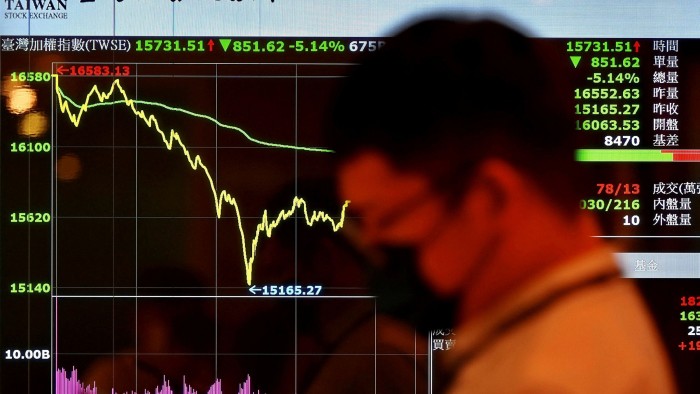Trading in Taiwan inverse ETF surged as stock market plunged

Simply sign up to the Exchange traded funds myFT Digest -- delivered directly to your inbox.
Interested in ETFs?
Visit our ETF Hub for investor news and education, market updates and analysis and easy-to-use tools to help you select the right ETFs.
As the Taiwanese stock market suffered the worst one-day drop last week, one inverse exchange traded fund recorded its highest trading volume and became the most traded security on the exchange.
Taiex, the weighted index for stocks listed on the Taiwan Stock Exchange, fell 8.55 per cent on May 12, the worst intraday decline since it was launched in 1969.
Market participants mostly blamed the crash on a sudden rise in reported coronavirus cases, which led to the expectation that imminent social distancing measures would be imposed by the government.
However, the scale and speed of the market plunge were unprecedented. By the end of the day, NT$2.07tn ($74bn) had evaporated from Taiwan-listed securities, data from the Taiwan bourse show.

This article was previously published by Ignites Asia, a title owned by the FT Group.
Local media reported that the country’s National Stabilisation Fund Committee was on standby to respond to the rout. Meanwhile, the Financial Supervisory Commission also issued an announcement informing investors that it was closely watching the market movements and would take relevant measures if necessary.
However, in the middle of the dramatic market fall, the locally listed inverse ETF managed to record a dramatic price surge and achieve the largest daily trading volume since its inception. Inverse ETFs aim to profit from a decline in its benchmark by investing in derivatives.
The Yuanta/P-shares Taiwan Top 50 1X Bear ETF, launched in October 2014 by Yuanta Securities Investment Trust, saw NT$6.35bn worth of trading as investors rushed to hedge their bets, data from the stock exchange show.
It also topped rankings in terms of trading value among all Taiwan-listed securities on May 12.
Much of the trading activity of the Yuanta/P-shares Taiwan Top 50 1X Bear ETF on May 12 came from investors selling their existing holdings of the ETF in anticipation of the market bouncing back, the research team of the Yuanta Daily Taiwan 50 Bull 2X ETF said.
Not much of that inverse ETF was redeemed on May 13 in the primary market, which shows that most of those who bought the ETF on Wednesday held on to the strategy the following day, the research team said.
“Inverse ETFs have always been a tool for shorting stocks or hedging. In a downward market, it is very normal to see more activity on these tools. But I would not say that there is a causal relationship between the trading volume of that ETF and the wider market drop,” said Jackie Choy, director of ETF research for Asia at Morningstar.
Although the trading volume of Yuanta/P-shares Taiwan Top 50 1X Bear ETF reached a record high of more than NT$6bn on May 12, it was still small compared with the total trading volume of NT$782.8bn in the broader market on the same day, which was also the highest in history, the exchange’s data show.
Three other inverse ETFs betting against domestic stocks are available in Taiwan provided by Fubon Asset Management, Cathay Securities Investment Trust and Capital Investment Trust Corporation.
The same providers also offer a combined total of four leveraged ETFs targeting domestic stocks available to Taiwanese investors.
Leveraged ETFs allow investors to amplify the returns of an underlying index. However, when the market falls, investors of leveraged ETFs also incur greater losses.
Taiwan leveraged ETF assets have rocketed in the past year. In March 2020, the four products had assets under management of NT$2.9bn. In the 12 months that followed, this figure jumped by a multiple of around 7.5 to NT$21.8bn, data from the Securities Investment Trust & Consulting Association show.
The four inverse ETFs saw their assets edge down from NT$69.2bn to NT$69.1bn in the same period.
The growth in Taiwan’s leveraged ETFs has been driven by institutional investors rather than retail investors.
While the number of retail beneficiaries of the four leveraged ETFs dropped from 4,230 to 1,916 in the past 12 months, the number of institutional investors edged up from 123 in March 2020 to 136 in March 2021.
*Ignites Asia is a news service published by FT Specialist for professionals working in the asset management industry. It covers everything from new product launches to regulations and industry trends. Trials and subscriptions are available at ignitesasia.com.

Click here to visit the ETF Hub

Comments